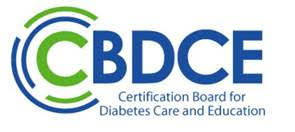Contact a CDCES for Help
Recently Diagnosed with Type 2 Diabetes?
Diabetes can be overwhelming. You can feel empowered and have peace of mind
with the support of a Certified Diabetes Care and Education Specialist (CDCES).
Turn the unknown into understanding.
What is a Certified Diabetes Care and Education Specialist (CDCES), and what do they do?
The CDCES promotes self-management to achieve individualized behavioral and treatment goals that reduce risks and optimize health outcomes. CDCESs have completed a rigorous process, including passing an exam to show they have specialized knowledge in diabetes care and management.
What is Diabetes Care and Education?
Why Should You See a CDCES?
When Should You See a CDCES?
Click here for information on the 4 key times for DSMES (Diabetes Self-Management Education and Support). The evidence is clear: DSMES improves A1C, reduces the onset/worsening of diabetes-related complications, enhances the quality of life, and provides healthy coping strategies.
Locate a CDCES-Certified Specialist
Use the Locate a CDCES Directory to find a CDCES near you.
Improve your Health - One Story
Additional Diabetes Resources: The Center for Disease Control and Prevention (CDC)
CDCESs can help you gain knowledge about a broad range of topics affecting diabetes management:
Problem Solving
Reducing Risks
Healthy Coping
Healthy Eating
Being Active
Monitoring
Taking Medication
Answers to Your Questions
-
What does a CDCES do?
-
A CDCES educates and supports people affected by diabetes to understand and manage the condition. A CDCES promotes self-management to achieve individualized behavioral and treatment goals that optimize health outcomes. CDCESs have passed a rigorous exam to show they have the knowledge to provide the education persons with diabetes need to manage their conditions.
-
How can a CDCES help me?
-
Successful self-management of diabetes involves knowledge about a broad range of topics such as healthy eating, taking medication, being active, and healthy coping. It’s not easy to gain all of the necessary knowledge without help. This is where your CDCES comes in.
-
I see my physician, isn’t that enough?
-
Diabetes care and education is a collaborative process involving you and other health professionals such as nurses, dietitian nutritionists, pharmacists, clinical psychologists, occupational therapists, optometrists, physical therapists, podiatrists, clinical exercise specialists, PAs, or exercise physiologists. Consulting with a Certified Diabetes Care and Education Specialist may lead to better outcomes. They partner with both you and your family on how to manage and improve your health.
-
I have just been diagnosed and have a referral to see a CDCES. What can I expect now?
-
The process varies from person to person. Generally speaking, once you get a referral from your provider you will spend some one-on-one time with your CDCES for an assessment and basic education. You may then be referred to group classes, or additional individual sessions based on your needs, where you will learn about skills to manage the disease in a variety of areas, including healthy eating, being active, taking medication, problem solving, reducing risks, monitoring, healthy coping, etc. You will also schedule follow-up visits as needed.
-
How does someone become a CDCES?
-
Diabetes care and education specialists are health professionals who must meet rigorous requirements before they are eligible to take the CDCES exam. Besides meeting a discipline requirement, e.g., license, registration, or advanced degree, requirements related to the individual’s experience as a health professional, including providing diabetes care and education to persons with diabetes, must be met. In addition, candidates must obtain continuing education related to diabetes. Eligible candidates must then take and pass a rigorous exam that covers the different areas related to managing the disease in order to earn their CDCES credential. They are also required to renew the credential every five years. Renewal helps to ensure that CDCESs continue to maintain and enhance their knowledge.
-
I want to work with a CDCES. What do I do first?
-
In most cases, you will need a referral from your provider. If your provider does not offer a referral to a CDCES, ask for one. You may also contact a CDCES near you and they will likely be able to walk you through the process. Find a CDCES near you.
-
How can I find a CDCES?
-
Certified Diabetes Care and Education Specialists can be found in many different healthcare settings, including hospitals, physician offices, private practice and clinics, to name a few. Find a CDCES near you.
-
How much does it cost to consult a CDCES?
-
Costs vary and, in some cases, may be covered by medical insurance. Consult with a CDCES in your area to find out the specific costs associated with their services or your insurance provider for coverage.


